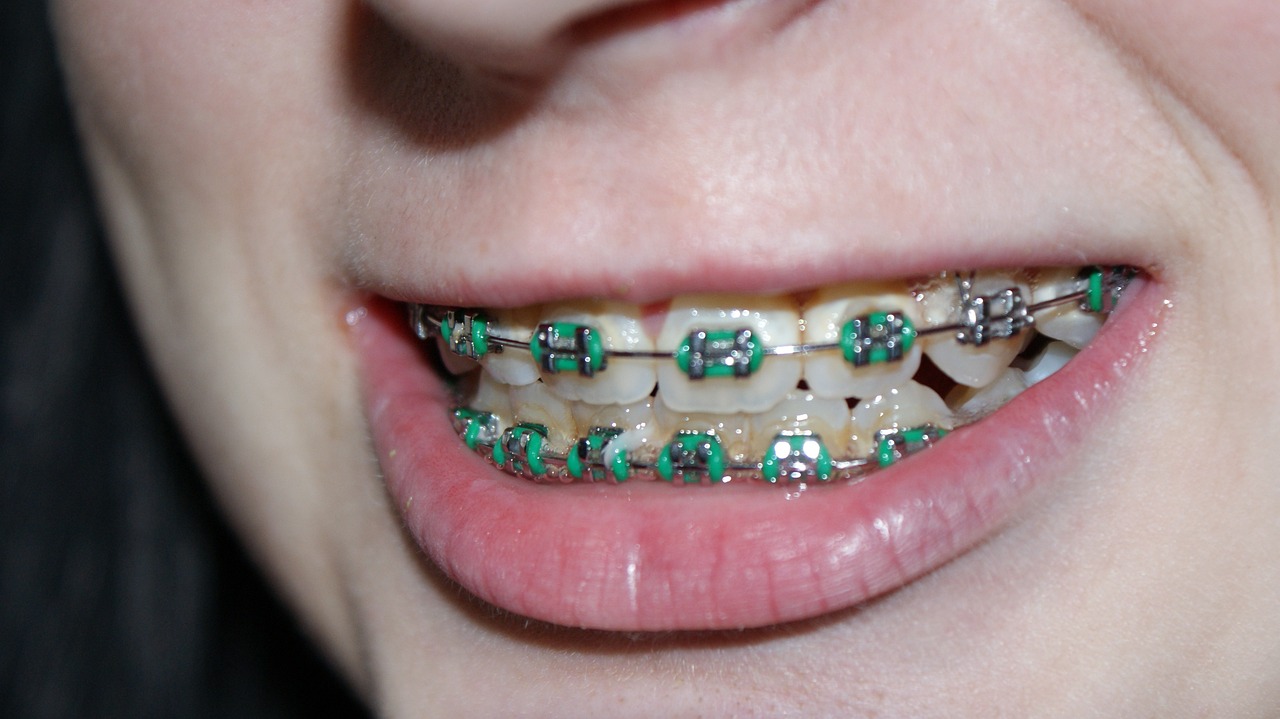
Image by August Hattinger from Pixabay
Braces treatment is crucial in correcting dental misalignments and helping individuals achieve a healthier, more functional, and aesthetically pleasing smile. Braces apply continuous pressure over time to move teeth into their desired positions gradually.
However, while they effectively treat issues like crooked teeth, overcrowding, and bite problems, braces also create new spaces in the mouth where food particles and plaque can accumulate. This increases the risk of tooth decay, gum disease, and other dental health issues. Therefore, maintaining good oral hygiene during braces treatment is essential to prevent these complications and ensure the effectiveness of the treatment.
Brushing Techniques for Braces
- Brushing frequency and duration: Brushing your teeth regularly is one of the most essential aspects of oral care during braces treatment. Brush at least twice daily, but ideally, after every meal or snack, to remove all food particles and plaque from around the braces and teeth. Each brushing session should last for at least two minutes, allowing enough time to clean every surface of the teeth thoroughly and around the braces.
- Proper brushing techniques: Proper brushing techniques are essential to maintaining oral hygiene with braces. Use a soft-bristled toothbrush to clean around the braces, wires, and brackets gently. Begin by holding the toothbrush at a 45-degree angle to the gums, and use small, circular motions to clean the outer surfaces of the teeth and braces. Pay extra attention to the areas above and below the braces, where food and plaque are most likely to accumulate. Tilt the brush to clean the tops of the brackets and under the wires, ensuring all surfaces are thoroughly cleaned. Consider using an interdental brush or an electric toothbrush with a special head designed for braces for better cleaning efficiency.
- Choosing the right toothpaste: Choosing toothpaste is also important when wearing braces. A fluoride toothpaste is highly recommended, as fluoride strengthens tooth enamel and helps prevent cavities. Some toothpaste brands also offer formulations specifically designed for patients with braces, providing additional protection against plaque and bacteria. Consulting with your dentist about the best toothpaste to use during your braces treatment can ensure optimal dental health.
Flossing with Braces
- The importance of flossing: Flossing is a critical component of oral hygiene, particularly for those with braces. Braces create additional areas where food particles and plaque can become trapped, increasing the risk of cavities and gum disease. Flossing helps remove debris between the teeth and around the braces that a toothbrush cannot reach, reducing the risk of decay and promoting healthier gums. Maintaining good oral hygiene is essential not only for a confident smile but also for overall health, similar to how specialized medical centers like the San Antonio Gynecomastia Center focus on personalized care to enhance well-being.
- Flossing techniques: Flossing with braces requires more effort, which is crucial for maintaining good oral health. Use a floss threader to guide dental floss under the braces’ primary wire (archwire). Gently slide the floss between the teeth, using a back-and-forth motion to remove food particles and plaque. Alternatively, a water flosser can be a more convenient option. It uses a stream of water to effectively clean around braces and between teeth, reaching areas that may be difficult to access with traditional floss.
Using Mouthwash
- Benefits of mouthwash: Incorporating mouthwash into your daily oral care routine provides additional protection against tooth decay and gum disease. Mouthwash can reach areas in the mouth that brushing and flossing might miss, helping to kill bacteria, reduce plaque buildup, and freshen breathing. It is beneficial for patients with braces, as it can help maintain oral hygiene even with the added challenges of braces.
- Choosing the right mouthwash: Selecting the right mouthwash is crucial for effective oral care during braces treatment. A fluoride-containing mouthwash is ideal, as it helps strengthen the teeth and prevent decay. Some mouthwashes are formulated explicitly for bracing patients, offering extra protection against plaque and bacteria. It’s best to consult your dentist to choose a mouthwash that meets your needs and complements your oral hygiene routine.
Additional Tips for Oral Hygiene with Braces

Image by Mystic Art Design from Pixabay
- Avoid sugary and sticky foods: Diet plays a significant role in maintaining oral health during braces treatment. Sugary and sticky foods can easily get trapped in the braces, leading to plaque buildup and increasing the risk of cavities. Foods like chewy sweets, toffee, and sugary snacks should be avoided as they can adhere to the braces and teeth, promoting bacterial growth. Instead, choose a balanced diet rich in fruits, vegetables, and other healthy options supporting overall dental health.
- Regular dental check-ups: Regular dental and professional cleanings are essential during braces treatment. These appointments allow your dentist to monitor your oral health and provide professional cleanings to remove any buildup that may have been missed during daily oral care routines. Dentists can also check the progress of your braces treatment and make necessary adjustments to ensure the best outcomes.
- Dealing with sore spots: Braces can sometimes cause discomfort or sore spots inside the mouth due to the brackets or wires rubbing against the cheeks or gums. To manage this, use dental wax to cover any parts of the braces that may be irritating. The wax provides a smooth surface, preventing the braces from rubbing against the soft tissues. Rinsing with a saltwater solution or over-the-counter pain relief can help alleviate discomfort.
Conclusion
Proper oral hygiene is essential during braces treatment to ensure a successful outcome and prevent potential dental issues. You can protect your teeth and gums from decay and gum disease by adhering to recommended brushing and flossing techniques, using fluoride-containing dental products, and avoiding sugary foods. Regular dental check-ups and discomfort management can further enhance your oral care routine. Prioritise your oral health during braces treatment by following these guidelines and consulting with your dentist for personalised advice, ensuring a healthy and beautiful smile once your braces are removed.
